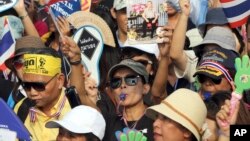BANGKOK —
Thailand's Senate has voted down a blanket amnesty bill seen as a move to ease political tensions that have triggered widespread street protests against the government of Prime Minister Yingluck Shinawatra. Protesters have called on the government to schedule new general elections.
After more than 12 hours of debate, the Thai Senate late Monday rejected the controversial blanket amnesty bill that has triggered the latest anti-government street protests.
Under Thailand’s political process, the bill could be returned to the House of Representatives for a new vote. But the government says it will not return the bill to the House.
The two-year administration of Prime Minister Yingluck Shinawatra has struggled to resolve the issue and curb protests led by the opposition Democrat Party.
An amended bill rushed through the lower House in late October offered blanket amnesties to several people close to the government, including the prime minister's older brother, Thaksin Shinawatra, who lives overseas to avoid a two-year jail term for corruption.
The amnesty also would have pardoned former prime minister and Democrat Party leader Abhisit Vejjajiva, who has been indicted for murder for ordering a crackdown on protesters in 2010.
The bill's initial version had bipartisan parliamentary support and was aimed at pardoning low-key protesters and others associated with acts of violence dating from 2004 until August of this year.
But critics say the amended bill would "whitewash" former leader Thaksin of corruption charges, enabling his return to Thailand. Present members of the Yingluck government also would be absolved of any charges of corruption.
As the Senate debated the bill, anti-government protesters stepped up their campaign on the streets of Bangkok, in a bid to force the government into new elections.
Khun Arporn, an office worker, said that despite promises by the government to drop the amnesty bill, the call is for the government to resign.
"Actually they [the protesters] want democracy, okay? But we need a good one - not the corrupt one," he said. "So we try to do our best. At least we want the world to listen to us that the government is not the right government for Thailand. Sometime they do something that's not good. All the people in Thailand think like that."
Protestors like Khun Art, an architect, say there are now growing fears of violence, after pro-government Red Shirt supporters rallied Sunday vowing to defend the government.
"The Red Shirts they are coming back - so that's what is coming - violence," she said. "For us we have no weapons - we only want to show our part, because we have been silent too long. But now we are coming out to show that we can't stand the government anymore."
The Yingluck government also has faced criticism over several development programs and populist economic policies that critics say are tainted by corruption.
The latest crisis has hit the Thai stock market and has affected Thailand's key tourism industry, with as many as a dozen countries posting travel warnings to their nationals to avoid protest areas in the capital, Bangkok.
After more than 12 hours of debate, the Thai Senate late Monday rejected the controversial blanket amnesty bill that has triggered the latest anti-government street protests.
Under Thailand’s political process, the bill could be returned to the House of Representatives for a new vote. But the government says it will not return the bill to the House.
The two-year administration of Prime Minister Yingluck Shinawatra has struggled to resolve the issue and curb protests led by the opposition Democrat Party.
An amended bill rushed through the lower House in late October offered blanket amnesties to several people close to the government, including the prime minister's older brother, Thaksin Shinawatra, who lives overseas to avoid a two-year jail term for corruption.
The amnesty also would have pardoned former prime minister and Democrat Party leader Abhisit Vejjajiva, who has been indicted for murder for ordering a crackdown on protesters in 2010.
The bill's initial version had bipartisan parliamentary support and was aimed at pardoning low-key protesters and others associated with acts of violence dating from 2004 until August of this year.
But critics say the amended bill would "whitewash" former leader Thaksin of corruption charges, enabling his return to Thailand. Present members of the Yingluck government also would be absolved of any charges of corruption.
As the Senate debated the bill, anti-government protesters stepped up their campaign on the streets of Bangkok, in a bid to force the government into new elections.
Khun Arporn, an office worker, said that despite promises by the government to drop the amnesty bill, the call is for the government to resign.
"Actually they [the protesters] want democracy, okay? But we need a good one - not the corrupt one," he said. "So we try to do our best. At least we want the world to listen to us that the government is not the right government for Thailand. Sometime they do something that's not good. All the people in Thailand think like that."
Protestors like Khun Art, an architect, say there are now growing fears of violence, after pro-government Red Shirt supporters rallied Sunday vowing to defend the government.
"The Red Shirts they are coming back - so that's what is coming - violence," she said. "For us we have no weapons - we only want to show our part, because we have been silent too long. But now we are coming out to show that we can't stand the government anymore."
The Yingluck government also has faced criticism over several development programs and populist economic policies that critics say are tainted by corruption.
The latest crisis has hit the Thai stock market and has affected Thailand's key tourism industry, with as many as a dozen countries posting travel warnings to their nationals to avoid protest areas in the capital, Bangkok.











